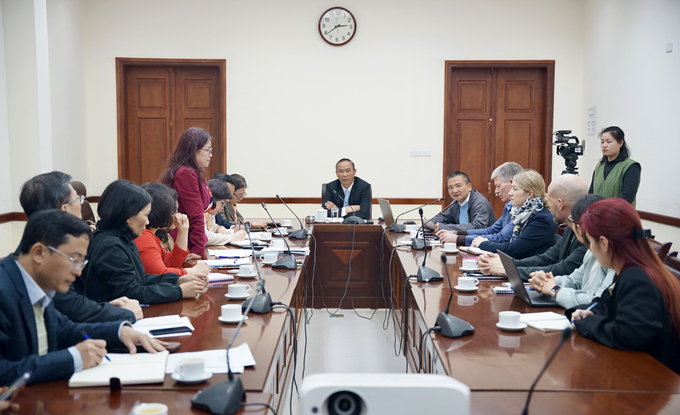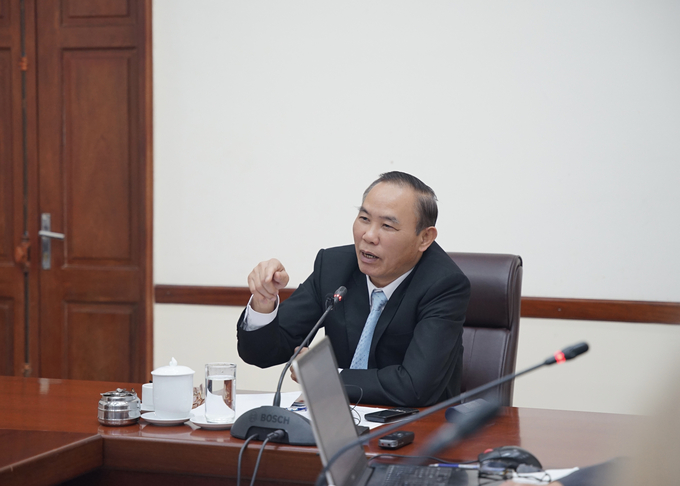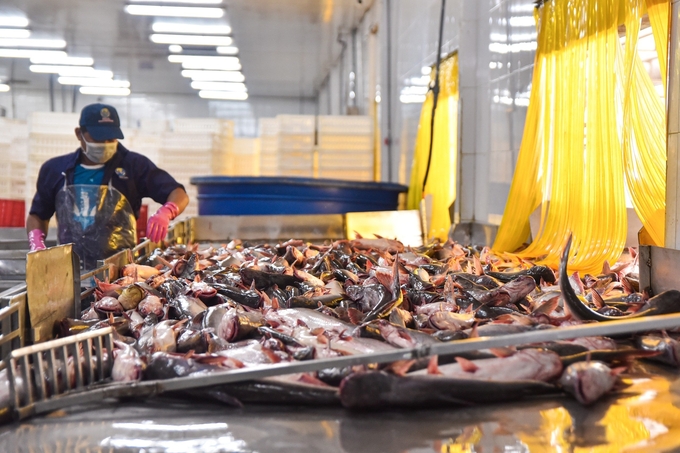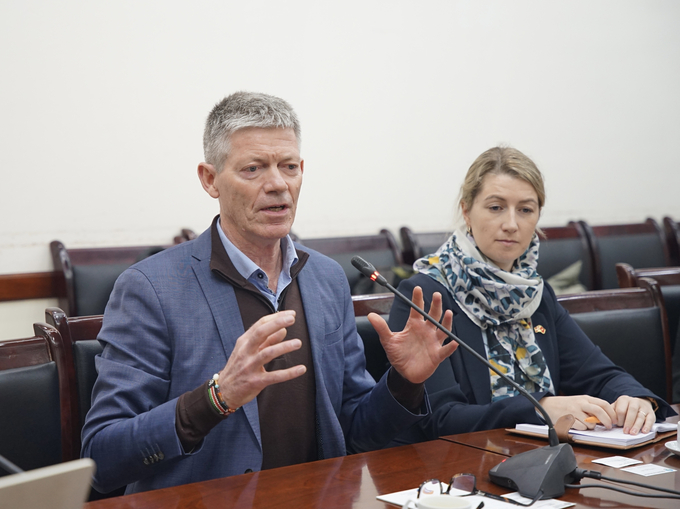May 30, 2025 | 07:21 GMT +7
May 30, 2025 | 07:21 GMT +7
Hotline: 0913.378.918
May 30, 2025 | 07:21 GMT +7
Hotline: 0913.378.918

On February 26, Deputy Minister of MARD Phung Duc Tien met with a delegation from the International Centre for Antimicrobial Resistance Solutions (ICARS).
In a report on the research activities "Reducing the use of antibiotics in catfish and tilapia farming in Vietnam" sponsored by ICARS, Associate Professor Dr. Dang Thi Lua, Director of the Research Institute for Aquaculture I, stated that it has actively collaborated with Can Tho University and relevant parties to implement the project documents and reach some agreements.
As a result, the project is being carried out under a research cooperation contract with four major components, the first of which is to conduct a comprehensive survey to understand the current state of catfish and tilapia farming in terms of farming techniques, diseases, antibiotic use, antibiotic resistance issues, and some antibiotic-reduction measures used by farmers. Based on the findings of the first component, two components are developed: reducing antibiotic use in catfish farming, investigating vaccine use, and implementing the In Pond Raceway System (IPRS) for tilapia farming. Component 4 involves researching and proposing strategies and institutions to assist farmers in reducing antibiotic use. ICARS has supported the RIA I a research cooperation contract of USD 631,050 for the years 2024-2026.

The Deputy Minister shared that for starters, antibiotic use is a major concern, but antibiotic residues present a barrier in terms of export and consumption.
Deputy Minister Phung Duc Tien stated that the Ministry of Agriculture and Rural Development recognizes this as an important financial resource and has issued a directive instructing RIA I to coordinate with institutes, universities, and relevant Vietnamese partners to implement research cooperation contracts on reducing antibiotic use in catfish and tilapia farming, with catfish being a key species in Vietnam's seafood export turnover.
The Ministry also needs the Institute to be the agency in charge of administering and implementing operations, budget allocation, tax payment, and settlement in compliance with the ICARS sponsor's requirements and Vietnamese regulations. At the same time, the Institute must report the research contract's implementation results to state management agencies under the MARD on a yearly and completion basis. The Ministry also mandates the International Cooperation Department and the Department of Animal Health to be the state management units in charge of managing and coordinating with the Institute during the research contract's implementation, as well as communicating with ICARS about any concerns that may arise.

Vietnam has 6,400 hectares of catfish farming, with a production output of approximately 1.62 million tons. Photo: Quynh Chi.
Vietnam has 6,400 hectares of catfish farming, with a production output of approximately 1.62 million tons. After nearly 25 years, the catfish business has emerged as the dominant aquaculture industry in the Mekong Delta region. To ensure the success of this investment project, Deputy Minister Phung Duc Tien offered several factors to consider.
For starters, antibiotic use is a major concern, but antibiotic residues present a barrier in terms of export and consumption. This issue is handled by Vietnam's Department of Quality, Processing, and Market Development. To fully analyze the issue, investigations are required, and this will be a critical data source.
Second, the Ministry has an aquaculture program that targets catfish. When developing policies, it is critical to combine them with policy communication. To produce catfish, it's important to consider fingerlings, feed, farming facilities, feed safety, biosecurity, disease safety, and antibiotic residues.We need to have a coordinated approach to catfish. As a result, the USD 631,050 investment is an important step toward the sector's long-term development," said the Deputy Minister.
Professor Anders Dalsgaard, Senior Scientific Advisor at ICARS, introduced ICARS as one of the first institutions to promote the growth of Vietnamese aquaculture. He echoed the Deputy Minister's emphasis on limiting antibiotic and chemical usage in aquaculture as a key component of sustainable aquaculture growth. This is particularly important for ensuring widespread acceptability and export of aquaculture products to high-demand countries.

Professor Anders Dalsgaard, Senior Scientific Advisor at ICARS, introduced ICARS as one of the first institutions to promote the growth of Vietnamese aquaculture.
"If we follow this trend, not only aquaculture products, but also cattle and crops, will demand attention to minimize antibiotic and chemical use in order to meet both export and domestic consumption criteria. This is a multi-party issue, and linking these stakeholders, which include businesses, individuals, and regulatory authorities, is critical. "We have made some progress," Dalsgaard stated.
Deputy Minister Phung Duc Tien underlined that while the pond-in-river system (IPRS) has gained popularity in Vietnam and vaccinations are employed by many large enterprises, the immunological response to vaccines remains limited. The Deputy Minister noted that the issue must be addressed through immunological solutions and vaccine use to improve efficacy.
MARD greatly appreciates ICARS' collaboration and support for the technical support project "Reducing the use of Colistin in pig farming in Vietnam".
Denmark has recently despatched high-level experts with vast experience to carry out operations as part of the effort to limit the use of Colistin in pig farming in Vietnam. However, due to objective influences such as the severe Covid-19 epidemic occurring in the years 2021-2022 and the new legislation on financial management systems in Vietnam changing in 2023, project works were terminated.
On this occasion, the Deputy Minister requested that ICARS continue to work with the Department of Animal Health and other relevant authorities to investigate opportunities for research collaboration on reducing antibiotic usage and antimicrobial resistance in pig and poultry farming in Vietnam in the future.
Translated by Dieu Linh

(VAN) Ms. Nguyen Thi Dung, Deputy Director of Ngoc Hoang Cooperative, shared about the journey of bringing dragon fruit to Europe, achieving annual revenues in the billions of VND.

(VAN) Bamboo products from Thang Tho Bamboo Cooperative have reached many countries around the world, while also creating jobs for local workers.

(VAN) The Management Board of Con Dao National Park reported that a green sea turtle, tagged in the Philippines, has traveled thousands of kilometers to lay 84 eggs on Bay Canh Islet.

(VAN) Green technology is paving a new path for sustainable aquaculture in the Mekong Delta in particular and across the country in general, helping reduce emissions and adapt to climate change.

(VAN) On May 27, La French Tech Vietnam (the French startup and innovation community in Vietnam) held the French Tech Summit Vietnam 2025.
/2025/05/27/4731-2-223159_980.jpg)
(VAN) No votive paper, no styrofoam, no plastic bags, no plastic bottles, and no single-use plastic trays are the key rules tourists should keep in mind when visiting Con Dao.

(VAN) In the fight against plastic pollution, Vietnam has been demonstrating a proactive, pioneering, and active role in addressing the greatest environmental challenge today.